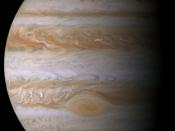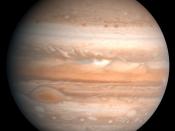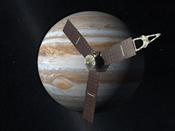Essay 3 The various gods that populate the myths Ovid uses in Metamorphoses contain several different aspects of personality and relate to people in very different ways. Each god is associated with a different type of myth that relates to his specific personality and the metamorphoses that occur within these stories are unique to each god.
Ovid portrays Jupiter as lustful, deceitful and violent as well as impulsive. Jupiter's deception and spontaneity often go hand-in-hand to accomplish one of his many schemes to seduce a woman for whom he lusts. Almost every rape involving Jupiter also involves a transformation of Jupiter into an animal or another person. For example, in order to rape Europa, Jupiter becomes a peaceful bull and grazes in a meadow to lure Europa onto his back. As the girl innocently hugs and decorates the bull with flowers, Jupiter's lust intensifies and when Europa climbs on his back, he races towards the sea.
Although Europa begins to become frightened, it is too late for her to turn back and Jupiter carries out his plan. Another scene involving Jupiter's lust is in the myth of Jupiter and Callisto. Jupiter's transformation into Diana deceives Callisto into coming close to him and then he takes advantage of her, stealing her innocence. Even while Jupiter was making plans to be with Io, Juno, his wife, "knew well the deceptions practiced by that husband, who had so often been caught behaving as he ought not."ÃÂ (page 45). Jupiter attempted to deceive Io by offering to her a shady grove in which to shelter herself from the sun, but she ran from him. Even though Io fled from Jupiter, he blanketed the earth in darkness and "robbed her of her maidenhood."ÃÂ (page 45) He later transforms Io into a cow to deceive his wife, who suspects that her husband has wronged her. When Jupiter's brother rapes Proserpine and takes her to be his wife, Ceres, Proserpine's mother, grows angry with Jupiter and asks him to make reconciliation. Jupiter sees nothing wrong with his daughter's marriage to his brother, revealing his selfishness because he will not think of his daughter, but only of his brother and himself.
Juno's personality is one of jealousy and revenge. Although she knows that her husband has been wronging many girls, Juno becomes jealous of the girls and does harm to them. When Juno hears of Jupiter's rape of Callisto, she turns Callisto into a bear, and Jupiter later mad Callisto and her son constellations. "When her rival was shining among the stars, Juno's wrath knew no bounds."ÃÂ Because of her fury at having one of her enemies above her, Juno visits Oceanus and requests that the two constellations not appear in the water. Even as Jupiter was planning to cheat on his wife, Juno felt jealousy towards those who Jupiter had raped in the past and grew suspicious of her husband. When Jupiter presented her with the cow, Juno knew that Jupiter was deceiving her in some way because of her jealousy. In addition to jealousy and revenge, Juno likes people to see her opinion as correct, while people should consider others in opposition wrong. When Juno argues with Jupiter over who gets most sexual pleasure, males or females, Juno refuses to believe Jupiter's proposition that the women are most pleased and she goes to ask Tiresias, who has been both male and female. When Tiresias agrees with Jupiter, Juno is angry and blinds him because he dared say she was wrong. Another example of Juno's vengefulness comes about in the story of Athamas and Ino. Juno is jealous of the riches of Athamas and Ino and sends the Furies to drive them crazy, which results in the death of Ino. As Ino is prays to Bacchus moments before her death, "Juno heard her, and laughed: "ÃÂMay the babe you reared ever bring you such blessing'"ÃÂ. (page 108) Juno has no compassion towards others and her selfish nature pushes her to seek revenge on any who could possibly become more popular than she is.
Apollo is a god who falls in love deeply, yet always has his love taken away from him. His son, Phoebus, asks to ride his father's car because Apollo had promised to give him anything he asked. Even though he had promised, Apollo, knowing the danger of his son's request, is almost ready to break his vow. Because he does not want to break a promise and because of his intense love for his son, Apollo allows Phoebus to drive his car, which results in the death of the one Apollo held so dear. Again, Apollo finds love in Leucothoe, but her parents find out about their affair and bury Leucothoe alive. Apollo adores her so much that his brightness wanes in his attempts to revive her, but his efforts fail. Even when Cupid shoots him with the arrow of love, Apollo is unable to capture his heart's desire. Daphne, whom he falls in love with, flees from him and undergoes a metamorphoses, from woman to tree, that does not allow Apollo to have a relationship with her. Hyacinthus, Apollo's close friend, is killed by one of Apollo's discus throws and, again, Apollo tries in vain to save the life of his beloved friend.
Ovid's portrayal of the gods in Metamorphoses mirrors the relationships of leaders in society and the various types of personalities found in any given community. Each god is unique and responds to people in a different way than the other gods, allowing them to become archetypes of different behaviors.





